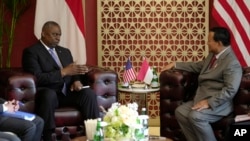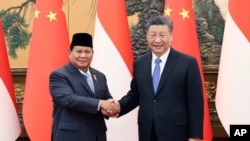Analysts expect a departure in style and substance from Prabowo Subianto, set to be inaugurated Sunday as Indonesia’s eighth president, compared to predecessor Joko Widodo.
“Prabowo will be a foreign policy president and have a hands-on approach in dealing with foreign policy matters,” said Fadli Zon, his longtime political party confidant and the chairperson of the House Committee for Inter-Parliamentary Cooperation.
“Just look at his style of diplomacy. He has personally met global leaders of large countries even before he is inaugurated.”
Former President Susilo Bambang Yudhoyono, who led Indonesia from 2004 to 2014, has made a similar prediction.
“Pak Probowo, ‘you are on the right track’ and have become ‘foreign policy President,’ he wrote in Indonesian on the social media platform X following Probowo’s remarks at the Shangri-la Dialogue 2024 forum in Singapore earlier this year. “Good luck and carry on!”
Indonesia held the rotating G20 presidency under Widodo and spearheaded diplomatic initiatives for peace in Myanmar as chair of the Association of Southeast Asian Nations last year. Widodo was also the first state leader to visit Ukraine and Russia after Russia’s full-scale invasion of its neighbor.
Widodo nevertheless mostly focused on domestic affairs and has never attended the United Nations General Assembly. Most of Indonesia’s foreign diplomacy was led by Foreign Minister Retno Marsudi.
Prabowo has visited more than 20 countries in the last six months as defense minister, and he met with state leaders in China, Japan, Australia, France, Russia, Saudi Arabia and Malaysia. He is the first president-elect to have gone on an overseas tour to strategic global partner countries before assuming office.
Associate Professor Teuku Rezasyah from Bandung’s Padjajaran University said this indicates he will be active internationally and is interested in building support and trust with global leaders early on.
While these meetings highlighted defense issues, the sessions included wider bilateral and geopolitical issues.
Prabowo, who lived in several countries in his youth, speaks English, Dutch, German and French.
Indonesia as influential middle power
Calvin Khoe, lead analyst at FPCI Research & Analysis, wrote in an East-West Center Asia-Pacific Bulletin that “Indonesia enjoys several comparative advantages that empower it as an activist nation and differentiate it as a middle power.” He added that Prabowo “will strive to make Indonesia an even more influential middle power.”
Khoe pointed out that in a Newsweek interview, Prabowo said Indonesia “must become more assertive in its foreign policy, bilaterally or multilaterally through its engagement in the U.N., OIC [Organization of Islamic Cooperation], ASEAN [Association of Southeast Asian Nations] and more responsive to shaping the geopolitical realities of our region.”
However, Dinna Prapto Raharja, founder of Jakarta-based Synergy Policies, said she expects Prabowo to show less enthusiasm for ASEAN than Widodo, who had said the Southeast Asian bloc was the cornerstone of his foreign policy.
“So, for somebody who is quick and pragmatic like Prabowo, I think he would not have enough patience to go through the nook and crannies of ASEAN. We’ve seen in the past 10 years how limited ASEAN resources can be to actually make impact at the state level.
“ASEAN at the people-to-people cooperation, I think will remain important. But I think he will want to take shortcuts to ensure timekeeping is more efficient.”
Resolving Israeli-Palestinian conflict
Prabowo has made the Israeli-Palestinian conflict a signature issue, indicating at the recent International Conference on Gaza in Jordan and the Shangri-La Dialogue in Singapore that Indonesia will support, contribute and facilitate all efforts toward a two-state solution.
These efforts may include the deployment of peacekeeping troops, air assets and a hospital ship, along with medical personnel to run a field hospital in Gaza.
Dinna said Probowo’s best prospects for impacting the conflict lie with the International Criminal Court and the U.N. Security Council.
“We’ve seen how Middle Eastern countries, since the Abrahamic Accord, has been split to different standings,” she said.
“So, if Indonesia wants to be quick, one of the most effective steps it can take is through multilateral forums. Indonesia can also develop caucuses in different agencies to build stronger voices, and also consult the secretary-general, who I’m sure is very much frustrated with the situation.”
Balancing global superpowers
On other issues, Khoe said Prabowo has appealed to China and the United States to be responsible global powers, arguing that the two global powers can co-exist, cooperate and collaborate.
Speaking at the Center for Strategic and International Studies Indonesia during the campaign, Prabowo committed himself to the principle of good-neighbor diplomacy, which stresses the importance of building a network of strong friendships with all countries in the region to ensure stability and economic growth.
In terms of Indonesia’s relations with China, Dinna said that Indonesia will continue to collaborate with China, Indonesia’s largest trading partner and a major investor in the country.
Prabowo is expected to remain cautious, however, regarding China’s aggressive posture in the South China Sea. China’s nine-dash line, which it claims to delineate its ancient fishing grounds, overlaps with Indonesia’s exclusive economic zone near Indonesia’s Natuna islands.
“I think, first and foremost, he would also make sure that he attends all the meetings and negotiation forums. This time he is not going to just send the foreign minister,” Dinna added.
“I think this is what’s going to be different between him and Joko Widodo. He is going to make sure he can talk in person with [Chinese President] Xi as president. He is also a very confident man in approaching other major countries interested in keeping the South China Sea safe.”
Although Prabowo has traveled the globe in recent months, he has yet to visit the United States. Observers say he is likely to wait for the U.S. presidential election results before he decides to do so.
Reuters reported that 36 state leaders will attend Prabowo’s inauguration. The United States is sending a six-person delegation led by U.N. Ambassador Linda Thomas-Greenfield and including Admiral Samuel Paparo, the commander of the U.S. Indo-Pacific Command.




